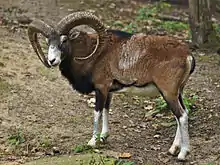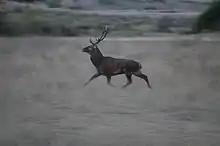List of mammals of Sardinia
This is a list of the mammal species recorded in Sardinia, Italy.[1]
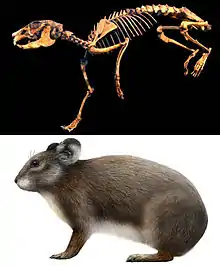
The following tags are used to highlight each species' conservation status as assessed by the International Union for Conservation of Nature.
| EX | Extinct | No reasonable doubt that the last individual has died. |
| EW | Extinct in the wild | Known only to survive in captivity or as a naturalized populations well outside its previous range. |
| CR | Critically endangered | The species is in imminent risk of extinction in the wild. |
| EN | Endangered | The species is facing an extremely high risk of extinction in the wild. |
| VU | Vulnerable | The species is facing a high risk of extinction in the wild. |
| NT | Near threatened | The species does not meet any of the criteria that would categorise it as risking extinction but it is likely to do so in the future. |
| LC | Least concern | There are no current identifiable risks to the species. |
| DD | Data deficient | There is inadequate information to make an assessment of the risks to this species. |
Order: Rodentia (rodents)
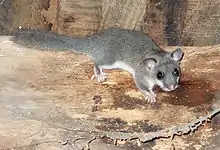
.jpg.webp)
Rodents make up the largest order of mammals, with over 40% of mammalian species. They have two incisors in the upper and lower jaw which grow continually and must be kept short by gnawing. Most rodents are small though the capybara can weigh up to 45 kg (99 lb).
- Suborder: Sciuromorpha
- Family: Gliridae (dormice)
- Subfamily: Glirinae
- Genus: Glis
- Edible dormouse, G. glis LC
- Genus: Glis
- Subfamily: Leithiinae
- Genus: Eliomys
- Garden dormouse, E. quercinus LC
- Genus: Eliomys
- Subfamily: Glirinae
- Family: Muridae (mice and rats)
- Family: Gliridae (dormice)
Order: Lagomorpha (lagomorphs)
The lagomorphs comprise two families, Leporidae and pikas. Though they can resemble rodents, and were classified as a superfamily in that order until the early 20th century, they have since been considered a separate order. They differ from rodents in a number of physical characteristics, such as having four incisors in the upper jaw rather than two.
Order: Erinaceomorpha (hedgehogs and gymnures)
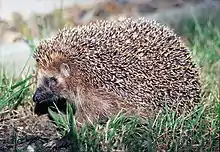
The order Erinaceomorpha contains a single family, Erinaceidae, which comprise the hedgehogs and gymnures. The hedgehogs are easily recognised by their spines while gymnures look more like large rats.
- Family: Erinaceidae (hedgehogs)
- Subfamily: Erinaceinae
- Genus: Erinaceus
- West European hedgehog, E. europaeus LC[7]
- Genus: Erinaceus
- Subfamily: Erinaceinae
Order: Soricomorpha (shrews, moles, and solenodons)
The "shrew-forms" are insectivorous mammals. The shrews and solenodons closely resemble mice while the moles are stout bodied burrowers.
- Family: Soricidae (shrews)
- Subfamily: Crocidurinae
- Genus: Crocidura
- North African white-toothed shrew, Crocidura ichnusae DD
- Genus: Suncus
- Etruscan shrew, Suncus etruscus LC
- Genus: Crocidura
- Subfamily: Crocidurinae
Order: Chiroptera (bats)
The bats' most distinguishing feature is that their forelimbs are developed as wings, making them the only mammals capable of flight. Bat species account for about 20% of all mammals.
- Family: Miniopteridae (long-winged bats)
- Subfamily: Miniopterinae
- Genus: Miniopterus
- Common bent-wing bat, M. schreibersii VU[8]
- Genus: Miniopterus
- Subfamily: Miniopterinae
- Family: Molossidae (free-tailed bats)
- Subfamily: Molossinae
- Genus: Tadarida
- European free-tailed bat, T. teniotis LC[9]
- Genus: Tadarida
- Subfamily: Molossinae
- Family: Rhinolophidae (horseshoe bats)
- Subfamily: Rhinolophinae
- Genus: Rhinolophus
- Mediterranean horseshoe bat, R. euryale NT[10]
- Greater horseshoe bat, R. ferrumequinum LC[11]
- Lesser horseshoe bat, R. hipposideros LC[12]
- Mehely's horseshoe bat, R. mehelyi VU[13]
- Genus: Rhinolophus
- Subfamily: Rhinolophinae
- Family: Vespertilionidae (mouse-eared bats)
- Subfamily: Myotinae
- Genus: Myotis
- Long-fingered bat, Myotis capaccinii VU
- Daubenton's bat, Myotis daubentonii LC
- Geoffroy's bat, Myotis emarginatus LC
- Felten's myotis, Myotis punicus NT
- Genus: Myotis
- Subfamily: Verpertilioninae
- Genus: Barbastella
- Barbastelle, Barbastella barbastellus NT
- Genus: Hypsugo
- Savi's pipistrelle, Hypsugo savii LC
- Genus: Plecotus
- Brown long-eared bat, Plecotus auritus LC
- Grey long-eared bat, Plecotus austriacus LC
- Sardinian long-eared bat, Plecotus sardus VU
- Genus: Pipistrellus
- Kuhl's pipistrelle, Pipistrellus kuhlii LC
- Nathusius's pipistrelle, Pipistrellus nathusii LC
- Common pipistrelle, Pipistrellus pipistrellus LC
- Genus: Barbastella
- Subfamily: Myotinae
Order: Cetacea (whales)
The order Cetacea includes whales, dolphins and porpoises. They are the mammals most fully adapted to aquatic life with a spindle-shaped nearly hairless body, protected by a thick layer of blubber, and forelimbs and tail modified to provide propulsion underwater.
- Suborder: Mysticeti
- Family: Balaenopteridae (rorquals)
- Genus: Balaenoptera
- Common minke whale, Balaenoptera acutorostrata LC
- Fin whale, Balaenoptera physalus VU
- Genus: Balaenoptera
- Family: Balaenopteridae (rorquals)
- Suborder: Odontoceti
- Family: Delphinidae (dolphins and pilot whales)
- Genus: Delphinus
- Short-beaked common dolphin, Delphinus delphis EN
- Genus: Tursiops
- Common bottlenose dolphin, Tursiops truncatus VU
- Genus: Stenella
- Striped dolphin, Stenella coeruleoalba VU
- Genus: Delphinus
- Genus: Steno
- Rough-toothed dolphin, Steno bredanensis LC
- Genus: Grampus
- Risso's dolphin, Grampus griseus DD
- Genus: Globicephala
- Long-finned pilot whale, Globicephala melas DD
- Genus: Orcinus
- Killer whale, Orcinus orca DD
- Family: Physeteridae (sperm whales)
- Genus: Physeter
- Sperm whale, Physeter macrocephalus EN
- Genus: Physeter
- Family: Ziphiidae (beaked whales)
- Genus: Ziphius
- Cuvier's beaked whale, Ziphius cavirostris VU
- Genus: Ziphius
- Family: Delphinidae (dolphins and pilot whales)
Order: Carnivora (carnivorans)
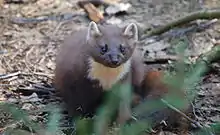
There are over 260 species of carnivorans, the majority of which feed primarily on meat. They have a characteristic skull shape and dentition.
- Suborder: Caniformia
- Family: Canidae (dogs, foxes, wolves)
- Family: Mustelidae (weasels)
- Genus: Martes
- European pine marten, M. martes LC[14]
- Genus: Mustela
- Least weasel, M. nivalis LC[15]
- Genus: Martes
- Family: Phocidae (earless seals)
- Genus: Monachus
- Mediterranean monk seal, M. monachus EN[16]
- Genus: Monachus
Order: Artiodactyla (even-toed ungulates)
The even-toed ungulates are ungulates whose weight is borne about equally by the third and fourth toes, rather than mostly or entirely by the third as in perissodactyls. There are about 220 artiodactyl species, including many that are of great economic importance to humans.
- Family: Suidae (pigs)
- Family: Bovidae (cattle, antelope, sheep, goats)
- Subfamily: Caprinae
- Genus: Ovis
- European mouflon, O. aries musimon
- Genus: Ovis
- Subfamily: Caprinae
- Family: Cervidae (deer)
- Subfamily: Cervinae
- Genus: Cervus
- Red deer, Cervus elaphus LC
- Corsican red deer, C. e. corsicanus
- Red deer, Cervus elaphus LC
- Genus: Dama
- Fallow deer, D. dama LC introduced
- Genus: Cervus
- Subfamily: Cervinae
See also
References
- The taxonomy and naming of the individual species is based on those used in existing Wikipedia articles as of 9 January 2013 and supplemented by the common names and taxonomy from the IUCN where no Wikipedia article was available.
- Musser, G.; Hutterer, R.; Kryštufek, B.; Yigit, N. & Mitsain, G. (2016). "Mus musculus". IUCN Red List of Threatened Species. 2016: e.T13972A115117618.
- Ruedas, L. (2016). "Rattus norvegicus". IUCN Red List of Threatened Species. 2016: e.T19353A165118026.
- Kryštufek, B.; Palomo, L.J.; Hutterer, R.; Mitsain, G. & Yigit, N. (2015). "Rattus rattus". IUCN Red List of Threatened Species. 2015: e.T19360A115148682.
- Hacklande, K. & Schai-Braun, S. (2019). "Lepus europaeus". IUCN Red List of Threatened Species. 2019: e.T41280A45187424.
- Johnston, C.H.; Robinson, T.J.; Child, M.F. & Relton, C. (2019). "Lepus capensis". IUCN Red List of Threatened Species. 2019: e.T41277A45186750.
- Amori, G.; Hutterer, R.; Kryštufek, B.; Yigit, N.; Mitsain, G. & Palomo, L. J. (2008). "Erinaceus europaeus". IUCN Red List of Threatened Species. 2008: e.T29650A9508000.
- Gazaryan, S.; Bücs, S. & Çoraman, E. (2020). "Miniopterus schreibersii". IUCN Red List of Threatened Species. 2020: e.T81633057A151216401.
- Benda, P. & Piraccini, R. (2016). "Tadarida teniotis". IUCN Red List of Threatened Species. 2016: e.T21311A22114995.
- Juste, J. & Alcaldé, J. (2016). "Rhinolophus euryale". IUCN Red List of Threatened Species. 2016: e.T19516A21971185.
- Piraccini, R. (2016). "Rhinolophus ferrumequinum". IUCN Red List of Threatened Species. 2016: e.T19517A21973253.
- Taylor, P. (2016). "Rhinolophus hipposideros". IUCN Red List of Threatened Species. 2016: e.T19518A21972794.
- Alcaldé, J.; Benda, P. & Juste, J. (2016). "Rhinolophus mehelyi". IUCN Red List of Threatened Species. 2016: e.T19519A21974380.
- Herrero, J.; Kranz, A.; Skumatov, D.; Abramov, A.V.; Maran, T. & Monakhov, V.G. (2016). "Martes martes". IUCN Red List of Threatened Species. 2016: e.T12848A45199169.
- McDonald, R. A.; Abramov, A. V.; Stubbe, M.; Herrero, J.; Maran, T.; Tikhonov, A.; Cavallini, P.; Kranz, A.; Giannatos, G.; Kryštufek, B. & Reid, F. (2019). "Mustela nivalis". IUCN Red List of Threatened Species. 2019: e.T70207409A147993366.
- Karamanlidis, A. & Dendrinos, P. (2015). "Monachus monachus". IUCN Red List of Threatened Species. 2015: e.T13653A45227543.
- Keuling, O. & Leus, K. (2019). "Sus scrofa". IUCN Red List of Threatened Species. 2019: e.T41775A44141833.
Further reading
- Aulagnier, S. et al. (2008). Guide des mammifères d'Europe, d'Afrique du Nord et de Moyen-Orient. Delachaux et Niestlé, Paris
- Shirihai, H. & Jarrett, B. (2006). Whales, Dolphins and Seals: A Field Guide to the Marine Mammals of the World. A & C Black, London
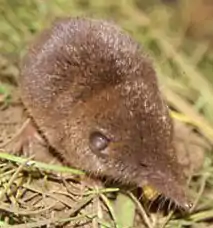
_-British_Wildlife_Centre-8.jpg.webp)
